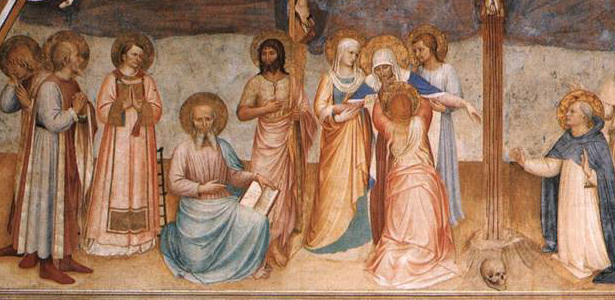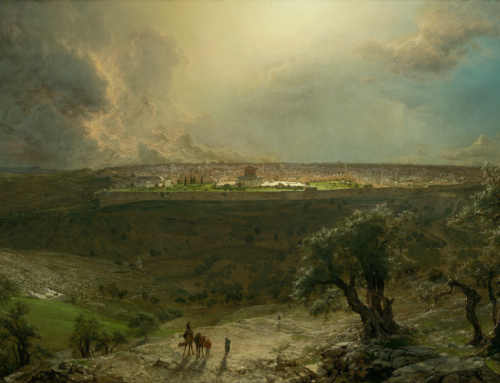As a child I remember being given a keychain or card meant to make me feel good about my baptismal name. As I recall, the intention of the giver was fully realized. The revelation made me quite proud: the tagline reading something like “Mark: mighty warrior.” Most little boys don’t put up a fuss when they learn their name is derived from Mars, the Roman god of war!
I did not yet know the story of the other Mark.
Christian tradition remembers the more humble origins of St. Mark (whose feast the Church celebrates tomorrow). First, we look to St. Mark’s Passion, to the betrayal and arrest of Jesus in the Garden of Gethsemane: “[the disciples] all left him [Jesus] and fled. Now a young man followed him wearing nothing but a linen cloth about his body. They seized him, but he left the cloth behind and ran off naked” (Mk 14:50-52).
Perhaps the young man would prefer that we gloss over this line and move on! However, some have suggested that the fleeing youth was the Gospel writer himself. Whether or not the scared adolescent was the Mark whom early Christians recognized to be the author of the earliest-penned Gospel, one thing is certain: he draws our attention and our empathy.
Indeed, Mark can teach us something about being Christian today, even though what we know about him can only be surmised and pieced together:
- Mark, who also was called by the Jewish name John, was the son of the Mary to whose house Peter fled after escaping from Herod’s imprisonment. The author of the Acts of the Apostles describes this house by saying that “many people gathered [there] in prayer” (Acts 12:12). Some have even suggested this to be the same place as the Upper Room where the Last Supper took place and the apostles received the outpouring of the Spirit at Pentecost.
- John Mark accompanied his cousin Barnabas and Paul on their first missionary journey (Acts 13). For some reason, Mark soon left Paul and his relative to return home. Paul later refused to bring Mark on a subsequent mission due to his previous desertion and lack of perseverance (Acts 15:38).
- In time, Mark appears to have become a co-worker of Paul in spreading the Gospel (see 2 Tim 4:11 and Col 4:10). This could be the same Mark who was affectionately referred to by Peter as his son (1 Pet 5:13). This same man, according to numerous Church fathers, worked as Peter’s secretary and composed the Gospel which takes his name.
So, not only did Mark grow up in a household of faith, but he may have met Jesus and witnessed the crisis of Holy Thursday. Later on he was invited to accompany his elders in proclaiming the new Christian faith. But for some reason–perhaps timidity, anxiety, or discomfort–he did not feel up to the task. Simply put, he was not yet willing to play that part.
But something more happened to John Mark. Later, as an evangelist, he penned Jesus’ response to the young man who would be his disciple:
“Amen I say to you, there is no one who has given up house or brothers or sisters or mother or father or lands for my sake and for the sake of the gospel who will not receive a hundred times more now in this present age: houses and brothers and sisters and mothers and children and lands, with persecutions, and eternal life in the age to come.” (Mk 10:29-30, emphasis mine)
Mark knew that being a follower of Jesus invited mockery and scorn even as it promised unimaginable blessing. Yet the example he gleaned from his mentor St. Peter–initial weakness, followed by a return to friendship with Jesus, and then great courage in the face of a horrible death–must have profoundly impacted his outlook.
Mark emphasizes the reason we have for hope amidst life’s struggles. First, as modern followers of Jesus we can be surprised by the support we receive from our new “brothers and sisters” in Christ. Next, when we do suffer for our faith–through ostracization, being bound by temptation and anxiety, sacrificing our time–we can take courage because we do not experience these things alone. Rather, we have these words of assurance, as recorded by Mark: “The God of grace who called you to his eternal glory through Christ will himself restore, confirm, strengthen, and establish you after you have suffered a little” (1 Pet 5:10). By his Cross, Jesus joins our plight and infuses it with new meaning.
St. Mark’s life and Gospel are not gifts to be taken lightly. He points past the physical safety and emotional contentment for which we often settle to something greater: a truly blessed life in this world, but not without sufferings, followed by the prize which exceeds all human hope. Yes, we need courage for this pursuit. But we should never rely on ourselves alone, lest we abandon Jesus upon discovering ourselves to be spiritually naked! May Jesus’ words to that earnest but imperfect youth be words that we trustingly take to heart: “For human beings it is impossible, but not for God. All things are possible for God” (Mk 10:27). Blessed the one who, with St. Mark, learns to stand by the suffering Christ so as to win every good thing.
St. Mark, mighty in courage, pray for us!
✠
Image: Fra Angelico, detail from Crucifixion and Saints (Convento di San Marco, Florence), of Sts. Mark, John the Baptist, and Dominic at the Crucifixion







